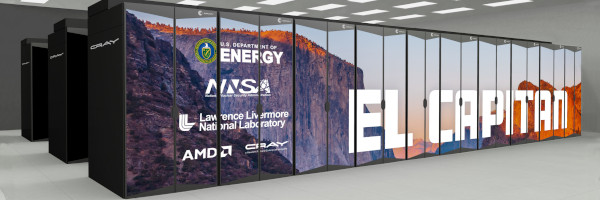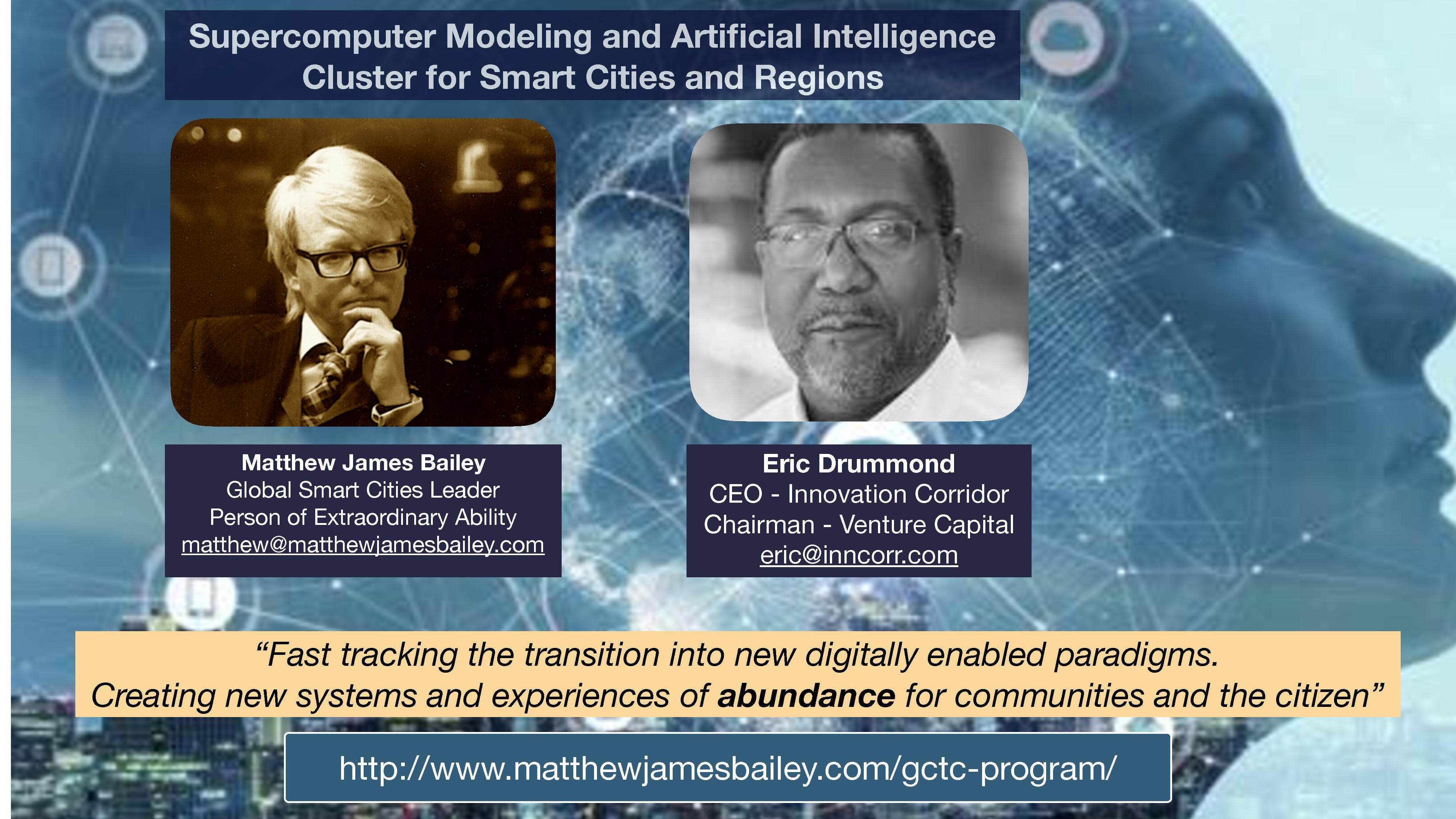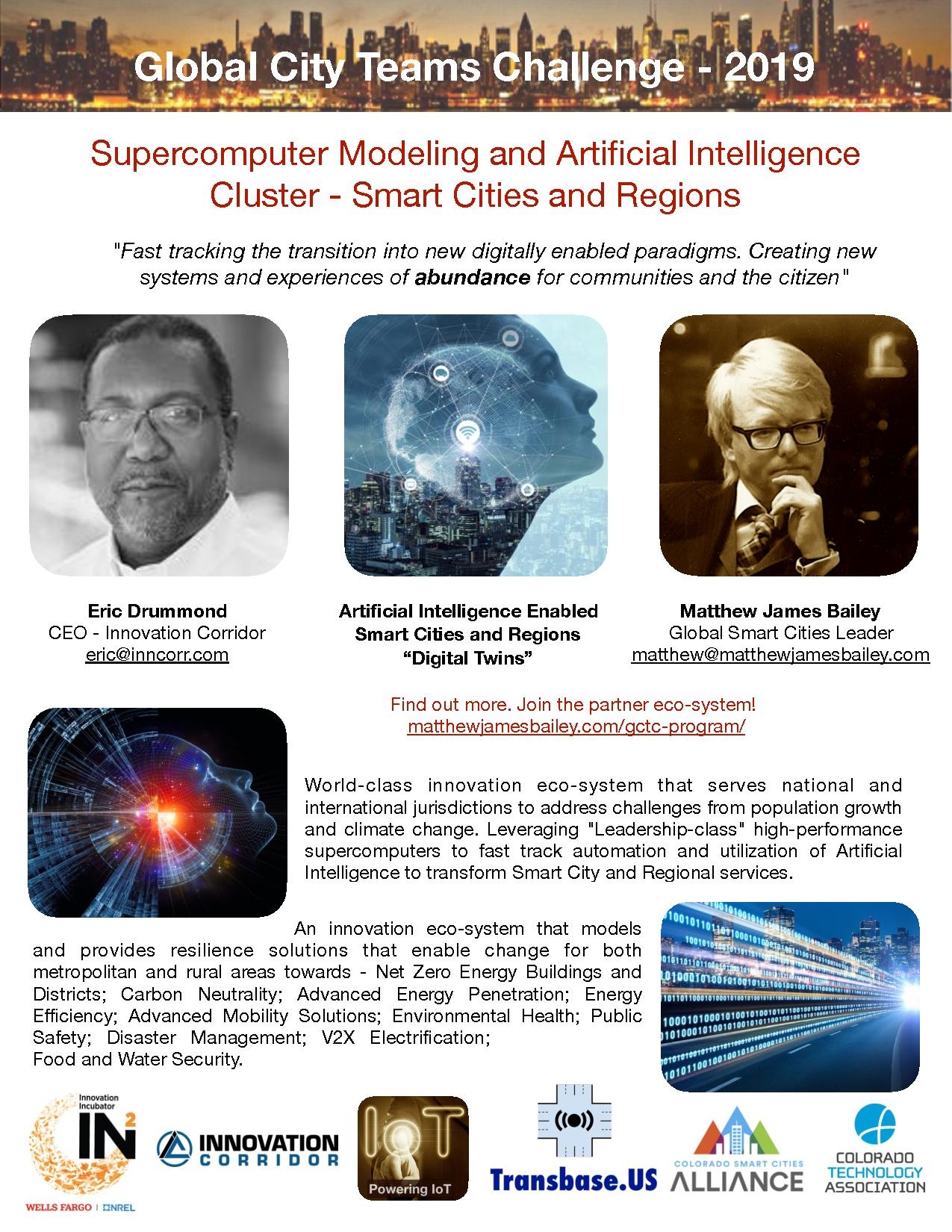Supercomputer Modeling and Artificial Intelligence Cluster for Smart Cities and Regions
| Supercomputer Modeling and Artificial Intelligence Cluster for Smart Cities and Regions | |
|---|---|

| |
 Epic HPC | |
| Team Organizations | Powering IoT National Renewable Energy Laboratory NCAR Venture Smarter Hitachi Century Link Ambient Enterprises (Intel) Denver University Colorado Technology Association Transbase.US US Department of Transportation Haave.io Stanley Group Colorado Smart Cities Alliance Accelerating Intelligence American Infrastructure Funds |
| Team Leaders | Matthew Bailey Eric Drummond |
| Participating Municipalities | Colorado |
| Status | Ready for Public Announcement |
| Document |  , , 
|
Description
National and International Innovation eco-system to serve challenges by using high-performance supercomputers to utilize existing and create novel Artificial Intelligence to develop Smart Cities and Region services, including resilience solutions (Net Zero Energy Buildings and Districts, Carbon Neutrality, Advanced Energy Penetration, Energy Efficiency, Advanced Mobility Solutions, Environmental Health, Public Safety, Disaster Management, V2X Electrification, Climate and Water).
This Cluster will deploy both proven, and newly devised, large-scale Smart City and Region supercomputing predictive analytics to model regional pathways into resiliency with identification of scientific and marketplace solutions to provision and deploy the right Smart City and Region solution stacks.
AI models will include the next generation of Artificial Intelligence, including Complex Systems Simulations, Emulation, and Optimization in order to create highly efficient and robust “autonomous systems” and portfolio-scale analytics and automated services. The predictive analytics developed by Innovation Corridor’s national lab partners will be part of the initial portfolio and baseline.
The Action Cluster will develop a repository of Artificial Intelligence technologies and architectures from founders (Innovation Corridor and Powering IoT) together with eco-system partners in order to fast track the next generation of automated, resilient, cyber secure, environmentally friendly and intelligence-driven distributed systems for Smart Cities and Smart Regions. In addition, new forms of Artificial Intelligence technologies and systems will be developed within this Action Cluster such as a "Personal Digital Twin" - a personal digital avatar that will purposefully and mindfully serves each citizen within a society.
Large-scale compute intensive data sets will train Artificial Intelligence solutions prior to deployment, which will be sourced from a range of partners, jurisdictions and localities and used to refine our Cluster Artificial Intelligence predictive analytics. An eco-system of cities, regions, federal research labs, private sector technology companies and universities provide a unique framework and sandbox to support the deployment of Smart Cities enabling technologies and the provision of resiliency-based and Artificial Intelligence solutions for Smart Cities and Smart Regions.
Challenges
Ability to quickly model large scale systems/challenges across a city and region in order to understand challenges in depth, from which the right solutions can be identified to create desired outcomes and measurable impact. Using predictive analytics to support the robust development of Smart Cities and integrating Smart Cities into Smart Regions. There are many technical and financial challenges, including, region-wide solution stacks, as well as, region-wide data platforms that have the ability to enable region-wide services.
Solutions
Collecting huge tranches of data sets from cities and regions in order to support the deployment of Artificial Intelligence throughout the built environment is a necessary challenge – Innovation Corridor national lab partners are one of the few entities globally with such expertise. Deployment of a Smart City and Smart Region marketplace of solutions utilizing Artificial Intelligence within and across multiple built environments, from the sensor, to the edge, to the gateway, to the cloud - if needed. One of the end results of this Cluster will be to integrate best-in-class partners, act as a national innovation center, and serve as a catalyst to support a broad range of jurisdictions in their regional transformation into the next generation of resilient, automated and adaptive societal systems and fabrics.
Major Requirements
Collect data sets from regional jurisdictions. Include additional data collected and validated by NREL and NCAR, which will be assimilated and analyzed in real-time and stored in a secure facility. The data sets will be used to develop Complex systems Simulations and Emulations to support Artificial Intelligence deployment for Smart City or Smart Regional challenges. High-performance supercomputing will be used to run independent agent models across a wide range of scenarios to determine the most robust and effective applications of AI and how such modeling measurably impacts a challenge. Deploy a Smart City and Smart Region test bed that will ingest Artificial Intelligence and run trials to validate performance, impact, and improvements. Iterate and improve until baseline Artificial Intelligence is ready for large scale validation across a state and deployment into other regions.
Performance Targets
| Key Performance Indicators (KPIs) | Measurement Methods |
|---|---|
|
Target challenges to address:
|
Data driven metrics from automated systems to measure impact in real-time all the way from research through to live trials. |
Standards, Replicability, Scalability, and Sustainability
IEEE - Smart City Standards. National standards – Based on standards being devised by NSF-“Building Energy-Smart Technologies” Industry University Cooperative Research Center deployment New national standards - AI, policy, solution templates, regional standards This Cluster is an innovation eco-system that will develop and trial solutions within Colorado and other jurisdictions that can be deployed, with adaptability, for regions across the globe.
Cybersecurity and Privacy
Testbeds for local government to innovate on policy and regulation to support this initiative will be needed. Multi-jurisdictional alliances will play an important role in formulating policies around data privacy and other related governance, and enabling collaboration for policies to be modelled, trailed, validated and iterated in the testbeds and, ultimately, standardized and scaled.
Cyber Security is a fundamental part of this initiative and as such NREL and private sector members will be using the very latest cyber security standards. NREL has developed a unique CyberSecurity national R&D program that will be the cornerstone of the SuperCuster’s cyber security initiative.
Impacts
We anticipate significant and replicable results. Once first projects are underway, an initial tranche of economic benefits as well as impacts on energy, health, safety, environment and other quality of life aspects will become available
Demonstration/Deployment
We will make an announcement of the Cluster with partners and explain why it is needed, how it works, who is involved and how it will serve the future.
Regarding resilience we can speak to past projects with a large international airport, a tier 1 city and a developing country. These are some of the baseline resilience models that we will be using to deploy and create impact across the USA and into international territories.
We are also involved in a significant grid related cyber security AI national initiative.
We will be outlining the timeline for this cluster to generate impactful resilience and AI in Smart Cities.